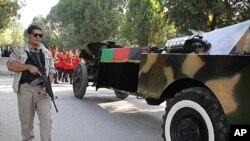Pakistan is strongly denying Afghan accusations of involvement in the killing of Afghanistan's former president and senior peace envoy. Meanwhile, Pakistan's government is offering to open talks with militant groups that renounce violence.
In a late-night statement, Pakistan’s Foreign Ministry severely criticized Afghanistan for alleging that Pakistan was involved in the assassination of the head of Afghanistan's High Peace Council, Burhanuddin Rabbani.
The former Afghan president was Kabul’s senior negotiator in planned talks with militant Islamic groups like the Taliban. He was killed by a suicide bomber last month.
Afghanistan's Interior Minister Bismullah Khan Mohammadi claimed Saturday that Pakistan’s Inter-Services Intelligence agency was involved Mr. Rabbani's assassination. He says it was carried out by a Pakistani citizen.
Islamabad’s sharply worded statement calls the accusations “baseless,” “irresponsible” and “regrettable.” It echoes public comments made Saturday by Pakistani Prime Minister Yusuf Raza Gilani.
Gilani said we are ready to provide intelligence or any other cooperation to Afghanistan, but I want to tell my brother (Afghan President Hamid) Karzai that he has some misunderstandings. Gilani added that Pakistan cannot supsected in the killing of Mr. Rabbani, who was a good friend to the country.
Gilani was quoted in Pakistani papers Monday as saying he wants to “give peace a chance” and offered to negotiate with militant groups that forswear violence.
In a private meeting with local news editors, he appears to have avoided detailed statements about the the Haqqani group, described last month by outgoing U.S. Joint Chiefs of Staff Chairman Mike Mullen as a “veritable arm” of Pakistan’s spy agency, the ISI.
The British Broadcasting Corporation Monday quoted Sirajuddin Haqqani, the head of the Haqqani network's operations, as saying in an audio recording believed to be authentic that his group was not responsible for killing Mr. Rabbani. He also said the Haqqanis have had no recent links with the ISI, and described his group as part of the Taliban movement.
With Mr. Rabbani’s death having severely damaged prospects for Afghan reconciliation, Afghan President Hamid Karzai said Saturday he will not engage in peace talks with the Taliban and will now only deal directly with Pakistan.
Professor Hassan Askari, the former head of the political science department at the University of the Punjab, says Pakistan will not accept that.
“Pakistan will not talk to Karzai on this issue," said Askari. "Pakistan will insist: go and talk to the groups that are based in Afghanistan; Pakistan will talk to the groups that are based in Pakistan. And obviously, Pakistan is not happy that Afghanistan has returned to the blame game, the same policy of blaming Pakistan for all what is happening in Afghanistan.”
Amid the flurry of accusations, U.S. Special Representative for Afghanistan and Pakistan Ambassador Marc Grossman is due to arrive here in Islamabad within weeks and is also scheduled to visit Kabul.




